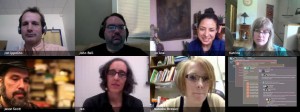The University of Maine’s Digital Curation program has already earned acclaim from its students, while the Education Advisory Board recognized it fulfills “a growing need in the public and private sectors” as employer demand for digital curation professionals has grown 60% from 2010 to 2013. Now, professors in the program have earned major awards that recognize their unique contributions to the field.
Digital Curation faculty members John Bell and Jon Ippolito have been awarded a 2015 e-Learning grant to extend the interactive, badge-based tutorial system they built for use by Digital Curation and other distance education students.
Many institutions of higher ed are exploring digital badges as a means of making learning more accessible, customizable, and accountable. What makes UMaine’s Just-in-Time Learning initiative unique is its incorporation of quiz-based tutorials that check student progress as they move through each lesson. The tutorials that teach programming, for example, require students to write correct code–but offer contextual hints to help learners avoid common pitfalls.
 In April, in recognition of his written contributions to the field of digital art and preservation, Ippolito was named the inaugural winner of the Thoma Foundation prize, in the Established Writer category. Ippolito responded that he was “stunned, honored, thrilled” to be accorded what amounts to the highest honor of his profession. He plans to dedicate this funding to build innovative platforms for the digital humanities.
In April, in recognition of his written contributions to the field of digital art and preservation, Ippolito was named the inaugural winner of the Thoma Foundation prize, in the Established Writer category. Ippolito responded that he was “stunned, honored, thrilled” to be accorded what amounts to the highest honor of his profession. He plans to dedicate this funding to build innovative platforms for the digital humanities.
In the meantime, guest visits from leaders in the field continue to bring innovations from the cutting edge to UMaine’s classes. The video recording from this spring’s luminary, Dragan Espenschied, is now live at:
DigitalCuration.UMaine.edu/teleconferences
 You can navigate through topics like browser-based emulation or Web archiving via the menu at bottom. The video archive includes last year’s talk by the always-entertaining Jason Scott of the Internet Archive.
You can navigate through topics like browser-based emulation or Web archiving via the menu at bottom. The video archive includes last year’s talk by the always-entertaining Jason Scott of the Internet Archive.
This fall’s classes include our introductory class (DIG 500) along with a more technically advanced class in Digital Collections and Exhibitions (DIG 540). The latter class introduces PHP and MySQL, technologies that power 80% of the Web including Facebook and Wikipedia.
For more information, please visit DigitalCuration.UMaine.edu.

